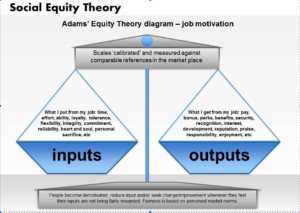Have you ever experienced unfair treatment at work? Have you ever felt like someone undeserving or unworthy got a promotion or position you wanted? Have you ever felt like you did not get the position you wanted because of a rigged process? In other words, have you ever felt like the organization screwed you? If so, I want you to take a few moments and think about how you reacted to the situation. Did you stop working as hard? Did you start working harder? Did you file a complaint or grievance? Did you give up? Did you leave the organization?
If you ever experienced these feelings and could not understand why, read on, as there is a theory for that. Adams’ equity theory identifies and explains the cause of your feelings and responses to perceived unfair treatment. In the following, we will discuss equity theory, the responses/coping mechanisms people use when feeling unfairly treated, and how you, in a leadership position, can help people overcome the equity issue(s) they are feeling.
What is equity theory?

So, what is this equity theory anyway? According to Adams’ equity theory, Individuals want and expect fair treatment. As such, individuals compare their inputs (effort, skills, and time) and outcomes (pay, training, promotion, and recognition) to those of their peers. If you perceive your inputs and outcomes are equal to your peer(s), you will feel a sense of fairness and equity. However, if you perceive your inputs and outcomes are not equal to your peer(s), you will experience feelings of inequity. In other words, if you are competing for a position with someone and you believe the person is just as qualified as you, more than likely if that person gets the position, you will not have an equity issue. However, if you believe that person is lesser qualified than you and the person gets the position, there is a good chance you will feel a sense of unfairness due to the outcome.
When the sense of unfairness or inequity sets in, a person can become grumpy and upset, which will affect behavior. You might see the person, who is normally upbeat, friendly, and positive become pessimistic, unpleasant, and negative. You may hear the person complaining about how the coworker got a promotion the person deserved because the coworker is a friend of the supervisor. That kind of negativity can spread faster than a rumor about free donuts in the break room.
Coping mechanisms:
This sense of unfairness can lead the person to use various coping mechanisms to restore the person’s sense of fairness. Such coping mechanisms can include:
- Altering inputs: A person may slow down or reduce the level of effort or skill the person normally puts out based on the perceived unfair treatment. For example, if the person believes the coworker who got the promotion is half the worker the person is, the person may slow work effort to match the coworker’s perceived level of effort.
- Altering outcomes: A person may file a complaint or grievance in order to change the outcome of the perceived inequity. This is a common response to perceived inequity. Another way a person might experience unfairness and alter outcomes is when the person feels overrewarded (i.e., the outcome is better than expected). The person might attempt to decrease the outcome to restore the person’s perception of fairness.
- Psychological distortion: The person distorts the person’s inputs or outcomes. One example of psychological distortion is the person does not do well on a test, so the person states, “I did not have time to study” or “The test was rigged” to favor the coworker who did better on the test.
- Acting on the reference source: This is accomplished when the person attempts to get the coworker (who is the person’s reference source) to either reduce efforts or reduce the outcome. For example, the coworker is working much harder than the person, so the person goes to the coworker and tries to get the coworker to slow down.
- Leaving the field: The person decides to transfer from the person’s current position or leave the organization due to the perceived unfair treatment.
- Changing the reference source or comparison other: The person stops comparing inputs and outcomes to the coworker who is the perceived source of the person’s inequity.
Why is understanding equity theory important?
Understanding equity theory is crucial for individuals experiencing feelings of unfairness for the following reasons.
- Self-awareness: Understanding equity theory allows individuals to gain self-awareness about their own reactions and emotions when faced with unfair treatment. It helps them recognize that their feelings of discontent or frustration are natural responses to perceived inequity.
- Validation of feelings: Equity theory provides a framework to validate and make sense of the emotions experienced when treated unfairly. It helps individuals realize that their feelings are legitimate and that others may have similar reactions in similar circumstances.
- Clarity on fairness expectations: By understanding equity theory, individuals can clarify their own expectations of fairness and evaluate whether those expectations align with the situation at hand. This helps in assessing the degree of unfairness and developing a clearer perspective on what they consider to be fair treatment.
- Assessing contributions and outcomes: Equity theory encourages individuals to assess their own contributions and outcomes in a given situation. It prompts them to reflect on the effort, time, and resources they have invested and compare them to the rewards or recognition received. This evaluation can provide insights into the perceived inequity and guide potential actions.
- Empowerment for action: Understanding equity theory empowers individuals to take proactive steps to address unfairness. It enables them to identify potential resolution techniques such as confrontation, seeking support, or altering inputs or outcomes, as discussed in the theory. This empowerment encourages individuals to advocate for themselves and work towards resolving the inequity they are facing.
- Managing expectations and reactions: Equipped with the knowledge of equity theory, individuals can better manage their expectations and reactions to unfair treatment. They can recognize that not all situations may be perfectly equitable, and sometimes there are factors beyond their control. This understanding allows them to adapt their mindset and focus on personal growth and resilience.
- Seeking resolution and growth: Understanding equity theory can guide individuals towards seeking resolution rather than dwelling on feelings of unfairness. Understanding the coping mechanisms associated with feelings of unfairness will help individuals find positive ways to address the inequity, which is conducive to personal growth and resilience.
Concerning leaders and supervisors, understanding equity theory is crucial for several reasons.
- Employee Motivation: Equity theory helps leaders understand the impact of fairness on employee motivation. When employees perceive fairness in the distribution of rewards and resources, they are more motivated to perform at their best. By applying equity theory, leaders can create a work environment that fosters motivation and engagement.
- Retention and Engagement: The perception of equity/fairness is closely linked to employee retention and engagement. If employees feel they are treated unfairly, they may become less committed to the organization, disengaged, and consider leaving. By understanding equity theory, leaders can identify and address potential equity issues, ensuring employees feel valued and committed to the organization.
- Team Dynamics: Equity theory has implications for team dynamics and collaboration. When team members perceive fairness in the distribution of rewards and recognition, it promotes trust and cooperation among team members. Leaders can use equity theory to foster a collaborative work environment and strengthen team cohesion.
- Organizational Culture: Equity theory plays a vital role in shaping and sustaining a positive organizational culture.Organizations that prioritize fairness and equity tend to have positive and inclusive cultures.Leaders who understand equity theory can create policies and practices that promote fairness, which will lead to a more harmonious and productive workplace.
- Performance and Productivity: Equity theory directly impacts individual and organizational performance. Employees that feel they are treated fairly are more likely to demonstrate higher satisfaction with their work, resulting in higher levels of productivity and better overall performance. Leaders can leverage equity theory to optimize performance and drive organizational success.
- Conflict Resolution: Equity theory provides insights into resolving conflicts and addressing grievances. By understanding the perceptions of fairness among individuals involved in a conflict, leaders can work towards finding equitable solutions that satisfy the parties involved and restore harmony within the team or organization.
- Decision-Making: Equity theory can guide leaders in making fair and ethical decisions. Leaders who are sensitive to and consider equity principles in decision-making processes, enhance transparency, reduce potential bias, and ensure equitable outcomes.
- Employee Well-being: Fairness is closely linked to employee well-being and satisfaction. Employees who perceive fairness in the workplace experience lower levels of stress and have better mental health. Leaders who embrace equity theory can create a positive work environment that supports employee well-being and contributes to their overall happiness.
Understanding equity theory empowers individuals to make sense of their feelings, evaluate fairness expectations, and take proactive steps to address feelings of unfairness and inequity when they arise. Additionally, understanding equity theory provides a framework for self-reflection, resolution, and personal growth, ultimately leading to improved well-being and satisfaction in the face of unfairness. For leaders, understanding and applying equity theory, will help them create a workplace culture that values fairness, motivates employees, fosters collaboration, and ultimately drives organizational success. Understanding equity theory is a powerful tool that enables leaders to navigate complex dynamics and ensure a harmonious and thriving work environment.
